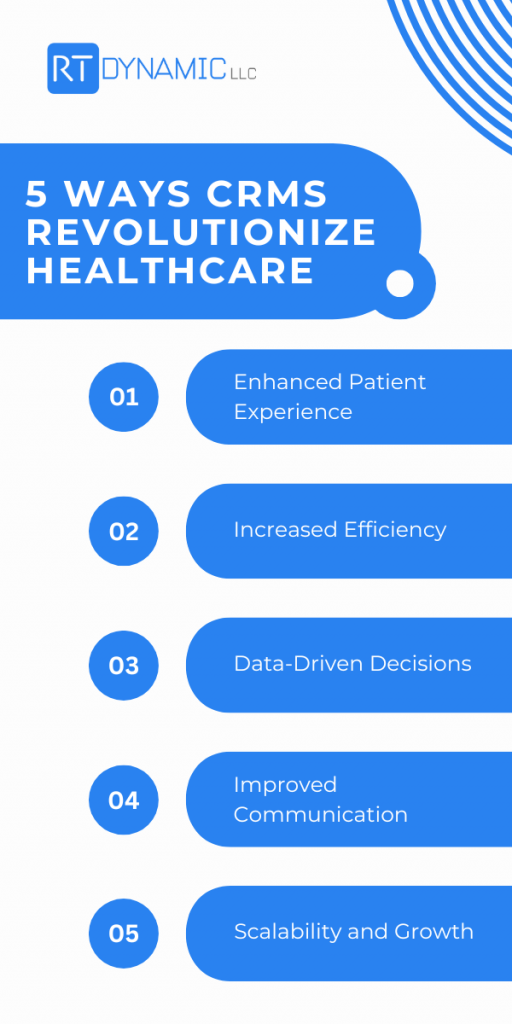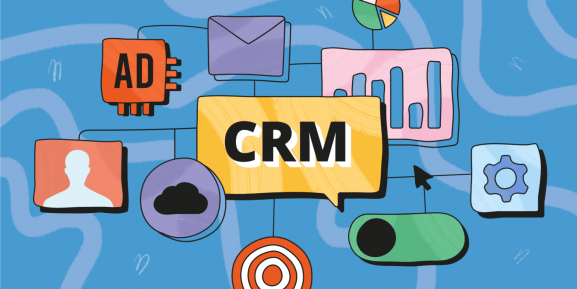As advancements in technology continue to make leaps and bounds, healthcare continues to improve. Whether it’s through new forms of medicine or the implementation of artificial intelligence, healthcare is progressing at a rapid rate.
The technology that we’ll be focusing on today however, is CRMs. A CRM system can provide doctors and health professionals with a significant boost in their overall efficiency and enhance patient engagement.
However, more often than not a lot of doctors and healthcare professionals make the mistake of not investing enough into their overall customer service. They’ll spend most of their investment on getting the latest medical equipment and redesigning their practice.
The aim of this article is to cover the best CRM software for doctors and health professionals while also looking at the overall importance and benefit of CRM in healthcare.
The Importance of CRM in Healthcare

While those that aren’t in the know might not be aware, the correct CRM platform can have a transformative impact on your health care practice. To properly understand the importance of CRM in healthcare, it’s essential to take a look at the challenges that healthcare professionals face.
Let’s go through some of the more major challenges Healthcare Professionals encounter:
Patient Management
If the size of the practice is small, then patient management may not be an issue. However, if the scale of the practice is large, then keeping track of patient records can be very challenging. Aside from there being the standard details that a customer provides, medical record keeping involves a lot more detail.
Doctors and healthcare professionals have to store medical history, the demographics, and overall communication preference. Keeping track of patients through a CRM platform like this can allow healthcare professionals to personalize care plans and engage in more targeted outreach.
Appointment Scheduling
Another major problem is overall appointment scheduling, without a CRM system scheduling appointments with patients and keeping track of all the different times is quite a challenging task. It also requires efficient communication between the staff and the respective patient to avoid any issues.
A CRM will help make the entirety of these tasks much easier, they feature easy online scheduling options, automatic confirmations, and automated messaging to patients in the case of their appointment.
Record-Keeping
Record keeping in the healthcare industry is also an essential but very arduous task. Doctors and healthcare professionals need to keep track of treatments, customer responses, their medical history, and much more.
Doing all of these tasks without a CRM can be super challenging. It's a very time consuming process and the more effort it requires also increases the chances for making a mistake.
Communication
Another problem that healthcare professionals encounter is that communication with patients can be a challenge. It’s essential to keep patients informed about any updates in their meetings or changes in their health.
A CRM platform will help make patient follow-ups much easier and can strengthen the overall relationship between the patient and provider. It’ll also minimize the scope of any potential errors that may occur.
How CRM Can Solve These Challenges
Now that you have an understanding of the challenges faced by doctors and healthcare professionals, let’s take a look at how the use of a CRM can help solve the challenges.
Centralized Patient Data
One of the primary features of a CRM is that it serves as a platform that centralizes all of your customer data. In the case of healthcare professionals that data will essentially be patient data. Now that all the patient data is in one place, it becomes significantly easier for healthcare professionals to access and sort the data accordingly.
That’ll help significantly improve overall productivity and collaboration. Additionally, getting access to this information also means that users will easily conduct analysis and engage in data-driven decision making.
Automated Workflows
One of the core features of healthcare service providers is that oftentimes there’s a large amount of tedious administrative work to complete. The sheer amount of administrative work to cover often means that employees are forced to delegate time away from other essential tasks.
The addition of a CRM will help greatly reduce the amount of administrative tasks that employees have to perform through automation. By automating workflows and making them more efficient, your team will be able to free up more time and increase their productivity. By focusing on the tasks that actually matter the most, they’ll be able to get more work done.
Improved Communication
Another challenging aspect of being a healthcare provider is communication. More often than not, there’s more than one contact that you have to keep track of for every patient. Ensuring two way communication between patient and service provider is essential to any practice.
A CRM makes storing this customer data much easier and with the correct integrations you can also handle all communications from the CRM. That’ll allow you to easily inform your customers about any updates or follow ups. An effective communication strategy can definitely help boost any healthcare service provider.
Enhanced Patient Experience
Lastly and arguably the main benefit that implementing a CRM software provides is that it significantly enhances the overall patient experience. When healthcare professionals have easy access to customer data, they can customize and tailor the experience for every single patient. With a tailored plan for every patient, you’ll be able to provide them with the best possible care.
Additionally, keeping track of patient care through your CRM is much easier than doing so without one. It greatly minimizes the overall risk of doctors and healthcare professionals committing any grave errors or mistakes.
By providing patients with the best experience possible, CRMs can help doctors and healthcare providers expand their services and scale to a larger level.
Key Features of a Healthcare CRM
Not just any CRM can fit in and work for a healthcare professional. A healthcare CRM needs to have a certain set of features to ensure that it fits the needs and requirements. Here are some of the key features that you can expect from the best healthcare CRMs on the market.
Patient Management
One of the main features of a healthcare CRM is that it needs to have some very necessary patient management features. A patient profile will contain all the essential information that doctors and healthcare professionals require to provide effective treatment.
These patient profiles will contain information on the customer’s biodata and their overall medical history. They’ll also contain other important data like the customer’s insurance information.
Using these patient profiles, healthcare service providers can make their overall patient management much easier.
Appointment Scheduling
Another major feature that a healthcare CRM needs to have is an appointment scheduling mechanism. Most people like to book their doctor's visit in advance rather than relying on a walk-in consultation. You can integrate your online booking system with your CRM to allow it to automate appointment scheduling.
With proper calendar integration, there won’t be any need to worry about appointments being missed or double booked. The CRM can also automate sending reminders to both the patient and the allocated healthcare provider. By automating these tasks, your healthcare service providers can switch to focusing on more essential tasks.
Communication Tools
A healthcare CRM isn’t going to work properly without the necessary communication tools. Aside from just communicating with the patients and potential clients, a CRM can also assist with any email marketing efforts.
It’ll make it much easier to run campaigns targeted to prior clients, and generate more business. Additionally, certain CRMs also offer telehealth integration if the service provider is interested in exploring that avenue of business.
Analytics and Reporting
Lastly, the final essential key feature a healthcare CRM must contain is an analytics and reporting suite. By being great stores of customer data a CRM can also be very effective for performance tracking purposes.
You’ll be able to identify which patients are going to be the ones that bring in the most amount of revenue, then you can tailor your service accordingly. These patient insights can effectively help you maximize the amount of revenue that your business can generate.
Relying on this sort of business intelligence does require your employees to spend some time training and understanding the CRM platform. However, it’s essential to leverage the insights that a CRM can provide.
Top CRM Software for Healthcare
With so many different CRM options available on the market, it can be super challenging for those that are unfamiliar to make a conclusive decision. However, there’s no need to worry. We’ll be going over some of the best CRM softwares that you can pick today.
Salesforce Health Cloud
Salesforce health cloud is one of the most comprehensive CRM solutions available for healthcare service providers. It empowers healthcare organizations to streamline their operations, improve patient engagement, and deliver personalized care.
Through using cloud technology and providing advanced features, healthcare organizations can provide patients with high quality care!
Key Features:
- Unified Patient View
- Intelligent Care Coordination
- Enhanced Patient Engagement
- Advanced Analytics
- Seamless Integration
Pros
- Advanced Features
- Enhanced Patient Engagement
- Seamless Integration
Cons
- High Cost
- Steep Learning Curve
SuiteCRM for Healthcare
SuiteCRM is a strong, open-source CRM platform that can be effectively customized to meet all the needs of healthcare organizations. What makes this CRM platform stand out are the flexibility, customization options, and competitive pricing models that make it suit healthcare providers of all different sizes.
Key Features
- Comprehensive Patient Management
- Improved Care Coordination
- Enhanced Patient Engagement
- Data-Driven Insights
Pros
- Open-source nature makes the software flexible
- Decent amount of features
- Cost-effective
Cons
- Requires a lot of customization
Microsoft Dynamics 365 for Healthcare
Microsoft Dynamics 365 for Healthcare is a complete CRM solution for Healthcare service providers. Its design helps streamline operations, improve patient engagement, and enhance decision-making in the healthcare industry. The CRM makes use of the Microsoft cloud services to help provide a unified platform for healthcare services.
Key Features:
- Unified Patient View
- Intelligent Care Coordination
- Enhanced Patient Engagement
- HIPAA Compliance
- Customizable Workflows
Pros
- Comprehensive view of patient information
- Advanced analytics to identify trends and predicting needs
- Easily accessible through any platform
Cons
- Requires significant adoption efforts
- High cost
Insightly
Insightly is another versatile CRM solution that can be used by healthcare service providers. It features a user-friendly interface, a strong suite of features, and HIPAA compliance which make it quite popular. The purpose helps manage patient relationships, streamline operations, and enhance the overall efficiency.
Key Features
- Centralized Patient Records
- Efficient Appointment Scheduling
- Improved Communication
- Integration with Other Tools
Pros
- Easily store and manage patient information
- Schedule appointments easily
- Simple integration with other tools
Cons
- No easy integration with healthcare tools
- Reporting and analytics features aren’t robust
HubSpot CRM
HubSpot CRM is a popular choice for organizations of all sizes, including healthcare professionals and doctors. It offers customers a user-friendly interface and a variety of features that benefit healthcare professionals and other doctors.
Key Features
- Contact Management
- Efficient Deal Pipeline
- Marketing Automation
- HIPAA Compliance
Pros
- User-Friendly Interface
- Free Plan
- Scalable
Cons
- Limited customization
- Advanced features are difficult to learn
- Not sufficient for complex healthcare needs
Choosing the Right CRM for Your Practice
After developing a decent idea of the best CRM options that are available for healthcare service providers, it’s important to know what goes into picking the correct CRM for your practice.
Factors to Consider
When picking the correct CRM for your practice, there are a few essential factors that customers need to consider before finalizing their decision. These factors include;
Practice Size:
The size of your practice has a significant impact on the CRM platform that you choose. If you have a larger business, then it’s evident that you’ll require a CRM capable of handling more complex healthcare features.
These platforms also tend to be more expensive so it’s important that you understand exactly what CRM will work for you depending on the size of your organization.
Budget:
While all CRMs at their core provide similar functions, it’s important to note that the budget definitely has an impact on your purchase decision. There are CRMs that offer free versions and some that charge close to $500 per month for their more premium service packages.
Your budget will have a major impact on the CRM options you can pick between.
Specific Needs
Lastly, a major factor to consider is the healthcare services needs and requirements. If you don’t require certain features, then there’s no need to opt for the more expensive CRM options.
Implementation Tips
Picking the right CRM for your healthcare service is just the first step in the process. It’s also important to ensure that the CRM implementation process goes smoothly. One of the most important things to focus on during the implementation process is the data migration.
Once you implement a new CRM, you’ll need to migrate all your existing data to the platform. If you’re not familiar with CRMs it’s best to leave the migration in the hands of a professional. That’ll ensure that you don’t encounter any data loss during the migration.
Furthermore, in order to successfully implement a CRM system, your employees will need to engage in proper training. Without any sort of training or familiarity with the platform, they’ll struggle to get the most out of the platform.
Lastly, you can also make customizations to the CRM platform to make it fit the requirements of your organization even more!
Conclusion
In today's fast-paced healthcare landscape, a robust CRM system is no longer a luxury but a necessity. By streamlining operations, enhancing patient engagement, and providing valuable insights, a well-implemented CRM can significantly elevate your healthcare practice.
Remember, the key to success lies in choosing the right CRM that aligns with your specific needs and budget. Whether you're a small clinic or a large healthcare organization, there's a CRM solution out there to empower your team and improve patient outcomes.
Ready to take your healthcare practice to the next level? Contact RT Dynamic today to discuss your unique needs and explore how our tailored CRM solutions can help you achieve your goals. Let's work together to build a healthier future.



